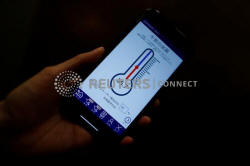|
Despite Japan's high-tech image, many businesses and government
offices still rely on fax machines, generating documents on
which officials can stamp their approval with traditional "hanko"
seals, and leaving a paper trail.
Prime Minister Shinzo Abe, who has been promoting working from
home to help slow the spread of the coronavirus, has told
cabinet ministers to overhaul regulations and identify
burdensome procedures with a view to scrapping or simplifying
them.
The health ministry said on Thursday it would launch the online
reporting system from May 10, with it going nationwide from May
17, to reduce the burden on health centres struggling with a
growing coronavirus epidemic.
Japan has had more than 14,000 confirmed cases of coronavirus
infection and 455 deaths, according to public broadcaster NHK.
Abe is expected to extend for about one month a state of
emergency, originally set to end on May 6, to fight the
outbreak.
A health ministry official said the new reporting system would
benefit health centres and boost the efficiency of its data
collection, including on new infections, hospitalisations and
severe cases.
Ruling Liberal Democratic Party lawmaker Masaaki Taira applauded
the ministry's decision.
"The IT environment for public health had taken a big step
forward," Taira said on Twitter.
Others were less impressed.
"Sorry, but I can't say 'well done'. What were you doing until
now?" said Twitter user mamazon.
"There seem to be lots of other handwritten faxes. I'm waiting
until they are all abolished."
(Reporting by Linda Sieg and Eimi Yamamitsu)
[© 2020 Thomson Reuters. All rights
reserved.] Copyright 2020 Reuters. All rights reserved. This material may not be published,
broadcast, rewritten or redistributed.
Thompson Reuters is solely responsible for this content.

|
|





